人教版七年级英语下册语法及知识点精讲
人教版七年级下册英语语法知识点归纳总结
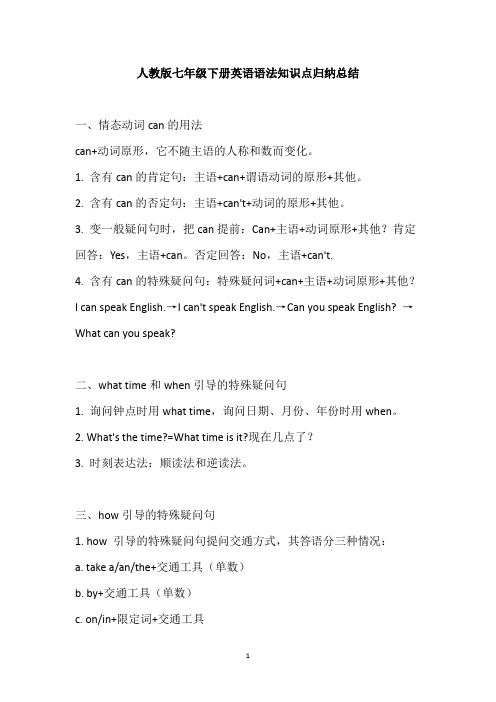
人教版七年级下册英语语法知识点归纳总结一、情态动词can的用法can+动词原形,它不随主语的人称和数而变化。
1. 含有can的肯定句:主语+can+谓语动词的原形+其他。
2. 含有can的否定句:主语+can't+动词的原形+其他。
3. 变一般疑问句时,把can提前:Can+主语+动词原形+其他?肯定回答:Yes,主语+can。
否定回答:No,主语+can't.4. 含有can的特殊疑问句:特殊疑问词+can+主语+动词原形+其他?I can speak English.→I can't speak English.→Can you speak English? →What can you speak?二、what time和when引导的特殊疑问句1. 询问钟点时用what time,询问日期、月份、年份时用when。
2. What's the time?=What time is it?现在几点了?3. 时刻表达法:顺读法和逆读法。
三、how引导的特殊疑问句1. how 引导的特殊疑问句提问交通方式,其答语分三种情况:a. take a/an/the+交通工具(单数)b. by+交通工具(单数)c. on/in+限定词+交通工具---How do you go to school every day?---I take a bus to go to school every day./I go to school by bus every day./I go to school on the bus every day.2. how far 用来提问距离,多远,其答语分为两种:(1)用长度单位表示:It is five kilometers.(2)用时间表示:It’s twenty minutes’walk.3. how long 用来提问时间,意为多久回答常用“for+段时”。
人教版英语七年级下册第四单元短语语法知识点总结知识讲解

人教版英语七年级下册第四单元短语语法知识点总结Unit 4Don’t eat in class【短语归纳】1.on time 准时,按时2. listen to …听……3. in class 在课上4. be late for 做……迟到5. have to 不得不6. be quiet安静7. go out外出 8. do the dishes 清洗餐具9. make breakfast 做早饭10. make (one’s) bed 铺床11. be noisy 吵闹12. keep one’s hair short 留短发13. play with sb. 和某人一起玩 14. play the piano 弹钢琴15. have fun 玩得高兴 16. make rules 制订规则【用法集萃】1.Don’t + 动词原形+其他,不要做某事。
2.help sb. (to) do sth. 帮助某人做某事3.too many + 可数名词复数太多的……4.practice doing sth. 练习做某事5. be strict with sb. 对某人要求严格6. be strict in sth. 对某事要要求严格7. leave sth sp. 把某物忘在某地8. keep + 宾语+形容词使……保持某种状态9. learn to do sth. 学会做某事10. have to do sth. 不得不做某事┃语法探究┃Ⅰ.祈使句定义:用于表达命令、请求、劝告、警告、禁止等的句子叫__________句。
时态:使用______________时态。
结构:动词原形+其他成分+ please. 否定祈使句在动词原形前面加__________ 。
如:Be quiet in the classroom, please.在教室里请保持安静。
Don't fight. 不要打架Ⅱ.情态动词have to 和must1.情态动词have to和must都表示“__________”的意思。
人教版七年级下册英语Unit 10 语法知识归纳
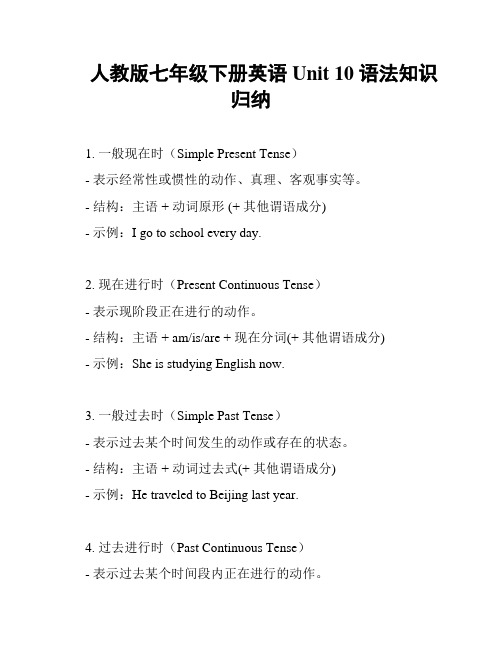
人教版七年级下册英语Unit 10 语法知识归纳1. 一般现在时(Simple Present Tense)- 表示经常性或惯性的动作、真理、客观事实等。
- 结构:主语 + 动词原形 (+ 其他谓语成分)- 示例:I go to school every day.2. 现在进行时(Present Continuous Tense)- 表示现阶段正在进行的动作。
- 结构:主语 + am/is/are + 现在分词(+ 其他谓语成分)- 示例:She is studying English now.3. 一般过去时(Simple Past Tense)- 表示过去某个时间发生的动作或存在的状态。
- 结构:主语 + 动词过去式(+ 其他谓语成分)- 示例:He traveled to Beijing last year.4. 过去进行时(Past Continuous Tense)- 表示过去某个时间段内正在进行的动作。
- 结构:主语 + was/were + 现在分词(+ 其他谓语成分)- 示例:They were playing basketball yesterday.5. 将来时(Future Tense)- 表示将来会发生的动作或存在的状态。
- 结构:主语 + will + 动词原形(+ 其他谓语成分)- 示例:We will have a party next week.6. 助动词的用法- “do”及其变化形式可用于否定句、疑问句和强调句。
- “be”用于进行时态和被动语态。
- “have”可用于完成时态。
- 示例:She doesn't like swimming. Did you go to the park? I do like chocolate.7. 特殊疑问词的用法- 针对特定方面的问题,使用特殊疑问词进行提问。
- 示例:What is your favorite color? Where did you go on vacation?以上是人教版七年级下册英语Unit 10关于语法知识的归纳。
期末复习人教版英语七年级下册单元重点知识点语法汇总

人教版七年级下册-单元重点语法汇总U1情态动词can的用法can是情态动词,意为“能,会”,表示某人或某物具备的能力,还可用来提出请求,没有人称和数的变化,后面直接接动词原形。
下面学习情态动词can的常见用法。
1.表示“能力”,意为“能,会”。
例句:I can speak English.我会讲英语。
2.表示“请求”或“许可”。
例句:Can you help me with my Chinese?你能帮我学汉语吗?You can go to the park after you finish your homework.你做完作业后可以去公园。
3.含有情态动词can的肯定句变否定句时,需在can后加not,其缩写形式为can’t;变疑问句时,情态动词can直接放在句首,构成一般疑问句。
例句:I can sing English songs.我会唱英文歌。
(肯定句)→I can’t sing English songs.我不会唱英文歌。
(否定句)Yao Ming can play basketball.姚明会打篮球。
→Can Yao Ming play basketball?姚明会打篮球吗?(一般疑问句)4.对Can…问句的回答可以用下面几种形式:对询问能力的问句的回答可以说“Yes,…can.”或“No,…can’t.”,表示对能力的肯定或否定;对表示请求的问句的回答可以说“OK./All right.”,表示同意对方的请求。
也可用certainly或sorry来回答。
用certainly作肯定回答,语气更肯定;用sorry作否定回答,语气则更委婉、客气。
例句:—Can you speak English?你会说英语吗?—Yes,I can.是的,我会。
—Can I see your pencil-box,please?请问,我可以看一下你的铅笔盒吗?—All right./Certainly.Here you are.可以。
人教版七年级英语下册重点短语及语法梳理

Unit1 Can you play the guitar?【重点短语】1. play the guitar 弹吉他2. play chess 下棋3. speak English 说英语3. what to do sth 想做某事4. join the music club 参加音乐俱乐部5. match…..with 与……匹配6. the swimming club 游泳俱乐部7. what club 什么俱乐部8. a sports club 一个体育俱乐部10. be good at telling stories 擅长讲故事11. the story telling club 讲故事俱乐部12. like to do/doing sth 喜欢做某事13. let’s join 让我们参加......14. sound good 听起来不错15. students wanted for School Show 学校表演招聘学生16. talk to/with sb 跟某人谈话17. after school 放学后18. do kung fu表演功夫练功夫19. show sb. sth.=show sth. to sb. 把某物展示给某人20. play games with people 和人们做游戏21.be in the school music club 在学校音乐俱乐部22. help for old people 对老人的援助23. be good with… 和某人相处得好,特长和..打交道24. be free / be busy 空闲的/忙的25. in July 在六月份26. tell sb. stories 给某人讲故事27. make frie nds with… 和某人交朋友28. call sb. at …… 给某人打……29. on the weekend 在周末30. help sb.〔to〕do sth. 援助某人做某事31. help sb. with sth. 在某方面援助某人32. English-speaking students 说英语的学生33. It is+adj +〔for sb〕to sth. 做某事〔对于某人来说〕是…..34. play the piano 弹钢琴35. play the violin 拉小提琴36. the Students’ Sports Center学生运动中心37. need help to teach music 需要援助来做某事38. need sb. to do sth 需要某人做某事39. teach sb. to do sth 教某人做某事40. be in our school music festival 参加我们学校的音乐节Unit2 What time do you go to school?【重点短语】1. go to school 去上学2. get up 起床3. get dressed 穿衣服4. brush teeth 刷牙5. eat breakfast 吃早饭6. take a shower 洗澡7. what time 什么时间8. at six forty 在六点四十9. an interesting job 一个有趣的工作10. at the radio station 在播送电视台11. usually /always/ often/ sometimes/ never 经常/总是/经常/有时/从不12. your radio show 你的播送节目13. from …..to 从….到…..14. at night 在夜晚15. a funny time 一个有趣的时间16. take exercise 锻炼17. be late for….. 因… 迟到18. at about ten twenty 在大约十点二十19. on weekends 在周末20. on school days 在上学日21. half past six 六点半22. a quarter past three 三点过一刻〔3:15〕23. a quarter to ten 十点差一刻〔9:45〕24. do 〔one’s〕homework 做〔某人的〕家庭作业25. take a walk 散步26. go to bed 睡觉27. eat quickly 吃得快28. have much time 有许多时间29. half an hour 半个小时30. get home 到达家31. either…..or 或者…….或者...... 32. eat a good breakfast 好好吃顿早餐33. lots of = a lot of 许多34. be good for….. 对…….有益35. taste good 尝起来好36. do her homework 做她的家庭作业37. have a healthy life 有一个健康的生活方式38. have dinner 吃晚饭Unit3 How do you get to school?【重点短语】1. get to school 到达学校2. take the train 乘火车3. take the subway 乘地铁4. ride a bike 骑自行车5. how do you get to school 怎么到达学校6. one hundred and five 1057. how far 多远8. how long 多长时间9. it takes sb some time to do sth 它花费某人多长时间做某事10. ride the bike to school 骑自行车到学校11. walk to , drive to ,fly to…步行去…;开车去…;坐飞机去….12. every day 每天13. I’m not sure 我不敢确信14. about= around 大约15. 10 kilometers 十公里16. good exercise 好的锻炼17. drive his car to work 开车去上班18. in his father’s car 坐父亲的车19. need about 10 minutes to get to school 需要十分钟的时间到达学校20. what do you think of=how do you like你觉得怎么样21. cross the river 过河22. It is easy to get to school. 到达学校很简单。
人教版英语七年级下册各单元重要语法内容

一、动词的一般现在时人教版英语七年级下册的重要语法内容之一为动词的一般现在时。
在学习动词的一般现在时时,学生需要掌握动词的三单特殊变化规则,即在第三人称单数时,动词需要在词尾加上-s或-es。
学生还需要学习动词的否定形式和疑问形式的构成方法,以及常见的一般现在时的时间状语如often, usually, always等的用法。
二、名词的单数和复数形式另一个重要的语法内容是名词的单数和复数形式。
学生需要了解名词单数和复数形式的规则,掌握常见的名词复数变化规则,如在词尾加上-s, -es, -ies等。
学生还要熟练掌握一些不规则名词的复数形式,如man-men, woman-women等。
三、形容词的比较级和最高级形容词的比较级和最高级也是七年级下册的重要语法内容之一。
学生需要学习形容词比较级的构成方法以及常见的比较级形式,如比较级+than, more+形容词等。
学生还需要了解形容词最高级的构成方法以及常见的最高级形式,如the+形容词最高级, most+形容词等。
四、介词的基本用法介词是英语中一个重要的语法内容,学生需要掌握介词的基本用法,包括介词表示地点、时间、方向、原因等的用法,以及介词与动词、名词、形容词的搭配。
学生还需要学习一些常用介词的用法,如in, on, under, behind, between等。
五、情态动词情态动词是七年级下册的另一个重要语法内容。
学生需要了解情态动词can, could, may, might, must, shall, should, will, would等的用法和意义,并能正确运用这些情态动词进行句子的构成。
学生还需要学习情态动词的否定形式和疑问形式的构成方法。
六、并列连词和从属连词七年级下册还包括并列连词和从属连词的学习。
学生需要了解并掌握一些常见的并列连词如and, but, or等的用法,以及从属连词如because, when, if, although等的用法。
人教版七年级英语下册 Unit 7 It’s raining!词汇精讲和语法
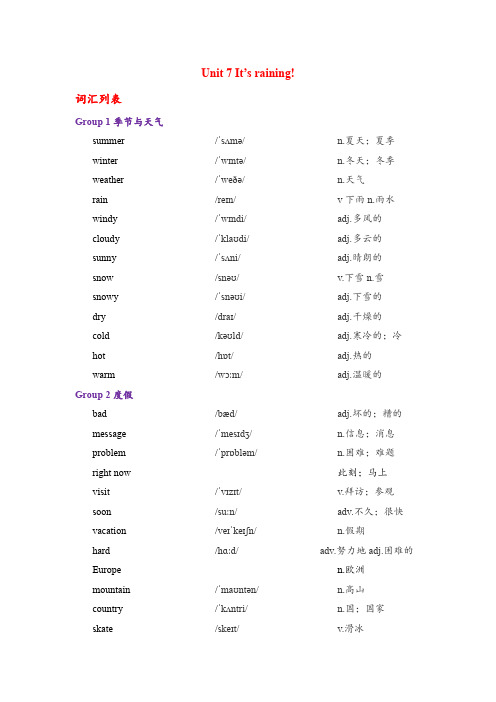
Unit 7 It’s raining!词汇列表Group 1季节与天气summer/ˈsʌmə/n.夏天;夏季winter/ˈwɪntə/n.冬天;冬季weather/ˈweðə/n.天气rain/reɪn/v下雨n.雨水windy/ˈwɪndi/adj.多风的cloudy/ˈklaʊdi/adj.多云的sunny/ˈsʌni/adj.晴朗的snow/snəʊ/v.下雪n.雪snowy/ˈsnəʊi/adj.下雪的dry/draɪ/adj.干燥的cold/kəʊld/adj.寒冷的;冷hot/hɒt/adj.热的warm/wɔːm/adj.温暖的Group 2度假bad/bæd/adj.坏的;糟的message/ˈmesɪdʒ/n.信息;消息problem/ˈprɒbləm/n.困难;难题right now此刻;马上visit/ˈvɪzɪt/v.拜访;参观soon/suːn/adv.不久;很快vacation/veɪˈkeɪʃn/n.假期hard/hɑːd/adv.努力地adj.困难的Europe n.欧洲mountain/ˈmaʊntən/n.高山country/ˈkʌntri/n.国;国家skate/skeɪt/v.滑冰词汇精讲1.visit & visitor(1)visit v. 参观; 拜访。
后接表示人或地点的名词。
(2)visitor n. 参观者;游客练习1:He _____________ (visit) his grandparents once a week.练习2:(翻译)在这个公园有很多游客。
______________________________________2. weather(1)n.天气。
(2)询问天气的常用句型: How’s the weather? =What’s the weather like?练习:-in Beijing?-It’s very cold in winter.A. How’s the weatherB. How’s the weather likeC. What’s the weatherD. What the weather like3. rain & rainy(1)rain v. 下雨n.雨水rainy adj. 阴雨的;多雨的snow v.下雪n.雪snowy adj. 有雪的(2)类似构词法归纳:cloud (云) →_____________ (多云的); sun (太阳)→_____________ (晴朗的) snow (雪) →______________ (有雪的); wind (风)→_______________ (多风的)练习1:-What’s the weather like?-下雨。
人教版英语七年级下册Unit2【重点短语+词法语法句法精讲】
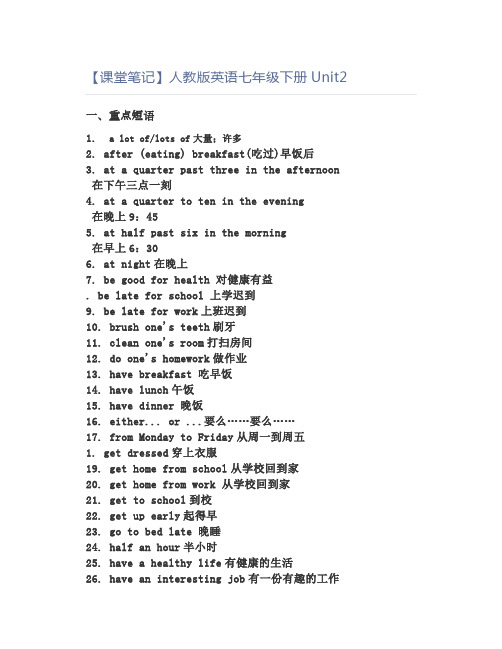
【课堂笔记】人教版英语七年级下册Unit2一、重点短语1. a lot of/lots of大量;许多2. after (eating) breakfast(吃过)早饭后3. at a quarter past three in the afternoon 在下午三点一刻4. at a quarter to ten in the evening在晚上9:455. at half past six in the morning在早上6:306. at night在晚上7. be good for health 对健康有益. be late for school 上学迟到9. be late for work上班迟到10. brush one's teeth刷牙11. clean one's room打扫房间12. do one's homework做作业13. have breakfast 吃早饭14. have lunch午饭15. have dinner 晚饭16. either... or ...要么……要么……17. from Monday to Friday从周一到周五1. get dressed穿上衣服19. get home from school从学校回到家20. get home from work 从学校回到家21. get to school到校22. get up early起得早23. go to bed late 晚睡24. half an hour半小时25. have a healthy life有健康的生活26. have an interesting job有一份有趣的工作27. take a walk散步2. on school nights在上学的晚上29. take a shower洗淋浴30. work at a radio station在电台工二、重点句型1.—What time/When do you usually exercise?你通常什么时候锻炼?—I usually exercise at five o'clock.我通常在5点锻炼。
(完整版)新人教版英语七年级下册1-12单元知识点归纳

Unit 1 Can you play the guitar?语言点梳理一、语法:情态动词:有一定意义,表示说话人的语气或情态,但不能单独作谓语,只能和其他动词原形一起构成谓语,没有人称和数的变化。
否定形式是在情态动词后面加上not。
变一般疑问句要把情态动词提到句子的开头,即:情态动词+主语+动词原形+其他?1.肯定句:He/She/I/We/They/You/Tom+情态动词can+动词原形.2.否定句:He/She/I/We/They/You/Tom+情态动词can+not+动词原形3.一般疑问句:情态动词can+ He/She/I/We/They/You/Tom+动词原形?Yes,主语+can./No,主语+ can’t.1)表示能力,“会;能”。
eg: Can you dance? 你会跳舞吗?2)表示请求或许可,“可以”。
eg: Can I ask you a question? 我可以问你一个问题吗?1. play the guitar/piano/violin/drums弹吉他/钢琴/小提琴/敲鼓play chess下象棋play sports 做运动play soccer/basketball踢足球、打篮球(乐器名称前加the,球类名称前不加the)2. join the art club加入艺术俱乐部/swimming club游泳俱乐部sports club运动俱乐部/story telling club讲故事俱乐部English club/ art club/ music clubjoin v.参加,加入指加入某个团体,组织,群体,并成为其中的一员。
What club do you want to join ?你想加入什么俱乐部?I want to join the swimming club.=I want to be in the swimming club.takeEg. take part in the meeting参加会议3. want sth.想要某物want to do sth.想做某事want sb to do sth 想要某人做某事4. be good at(doing...)擅长于=do well in 在某方面做得好be good with与…相处的好be good for对…有益5. like to do sth.喜欢做某事like doing sth.6. Let’s do sth.让我干…let/make sb.do sth.使某人做某事10. write stories写故事write to sb= write a letter to sb= write sb a letter11.tell /speak/say/talk的用法1) tell讲述一件事实或故事等及物动词tell sb. sth 给某人讲某事=tell sth to sb 把某事告诉某人tell sb. to do sth 告诉某人做某事tell stories讲故事=tell a story tell a lie撒谎2)speak v. 主要是讲说话的能力,往往接语言speak English讲英语3)talk 为不及物动词往往加介词再接宾语talk to sb.和…交谈/talk with sb.和…交谈(指双方)4)say往往接说话的内容eg.Our teacher says we should study hard.say it in English用英语说它12. make friends with sb.和…交朋友13. play games with sb.和…做游戏14. help sb. with sth.= help sb. (to) do sth.帮助某人做某事15. call sb. at +电话号码给某人打电话拨+号码16. on /at the weekend 在周末on weekends after school放学后17.do Chinese kung fu 打中国功夫18.be free 空闲的19. sing very well 唱得好That sounds good. 那听起来很好20.English-speaking students 讲英语的学生学生运动中心23.also /too/eitheralso/too用在肯定句,also 用于句中,too 用于句尾,either用于否定句句未eg. I am a student . He is a student,too. I am a student . He is also a student.I am not a student . He is not a student, either.24.and/or 连接两个并列成分eg.I can sing and dance.(and用于肯定句)I can’t sing or dance.(or用于否定句)Can you sing or dance ?(or用于选择疑问句“或者”)25.at27. need to do sth需要干某事need sb. to do sth 需要某人干某事28.wanted students for School show学校表演招聘学生v.展示;给….看… show sb. Sth= show Sth to sb.给某人展示n.节目;表演TV show电视节目29.teach v.教,讲授teacher n.教师teach sb.English教某人英语teach sb. sth .= teach sth to sb.教给某人某事=教某事给某人teach sb.to do sth教给某人做某事30.music n.音乐musician n. 音乐家31.piano (pl.) pianosUnit 2 What time do you go to school?知识点梳理1.What time do you get up?What time +助动词do/does +主语+动词原形,询问某人做某事的具体时间。
人教版七年级下册英语Unit12单元语法知识点总结

人教版七年级下册英语Unit12单元语法知识点总结本单元重点短语的具体用法1. Last weekend:用于描述过去的时间,通常在句子中作时间状语。
例如:I went shopping last weekend.(我上周末去购物了。
)2. Do one's homework:表示做作业。
例如:I need to do my homework before going out.(我需要在出去之前做作业。
)3. Go to the cinema:去看电影。
例如:They decided to go to the cinema instead of staying at home.(他们决定去电影院而不是待在家里。
)4. Go boating:去划船。
例如:We went boating on the lake and had a great time.(我们在湖上划船,玩得很开心。
)5. Camp by the lake:在湖边露营。
例如:They camped by the lake and enjoyed the beautiful scenery.(他们在湖边露营,欣赏美丽的风景。
)6. Go to the beach:去海滩。
例如:I like to go to the beach to relax.(我喜欢去海滩放松。
)7. Play badminton:打羽毛球。
例如:They played badminton in the park.(他们在公园里打羽毛球。
)8. On Saturday morning:在周六的早上。
例如:On Saturday morning, I usually sleep in.(在周六的早上,我通常会睡懒觉。
)9. Study for the English test:为英语考试学习。
例如:I have to study for the English test tomorrow.(我必须为明天的英语考试学习。
人教版英语七年级下册unit1+2核心考点归纳(语法+词汇+短语+重点句子)

人教版七年级下册unit1+2核心考点及语法归纳【unit 1语法】一、情态动词can的基本用法情态动词can有一定的词义,但不能独立存在,它必须与动词原形一起构成谓语。
can没有人称和数的变化。
其具体用法如下:1.表示"能、会",指脑力或体力方面的"能力"。
例如:I can speak English.我会讲英语。
Jim can swim but I can't.吉姆会游泳,但我不会。
2.表示"可能",常用于否定句或疑问句中,指某种可能性。
例如:Han Mei can't be in the classroom.韩梅不可能在教室里。
Can he come here today, please?请问他今天能到这里来吗?3.表示"可以",常用于口语中,指许可或请求做某事。
例如:Can I have a cup of tea, please?请问我可以喝一杯茶吗?You can go out.你可以出去了?二、情态动词的注意事项1. can的口诀:情态动词can、can、can,动词原形跟后面。
变疑问can提前,变否定not后面加上去。
主语人称单复数,情态动词不能变。
2. 情态动词can可以引导肯定句和疑问句。
肯定句:主语+ can + 动词原形+ 其他成分疑问句:can + 主语+ 动词原形+ 其他成分3.can 引导的肯定句变为疑问句的方法:(一调二改三问号)can 提前,首字母大写。
(一调)肯定句中主语在变成疑问句时的变化。
(二改)如:肯定句:You can feed the animals.你可以喂动物。
疑问句:Can I feed the animals?我能喂动物吗?在句尾后面加问号。
(三问号)4. Can的一般疑问句回答:肯定回答:Yes,主语(必须人称代词)+ can.否定回答:No,主语(必须人称代词)+ can not (can’t)/mustn’t. Yes 或no 后要使用逗号,除了I 以外,其他人称都要小写。
七年级下册英语知识点总结归纳人教版
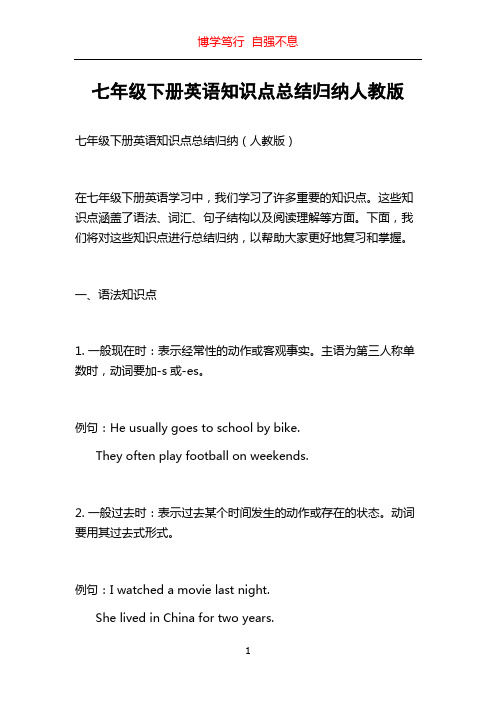
七年级下册英语知识点总结归纳人教版七年级下册英语知识点总结归纳(人教版)在七年级下册英语学习中,我们学习了许多重要的知识点。
这些知识点涵盖了语法、词汇、句子结构以及阅读理解等方面。
下面,我们将对这些知识点进行总结归纳,以帮助大家更好地复习和掌握。
一、语法知识点1. 一般现在时:表示经常性的动作或客观事实。
主语为第三人称单数时,动词要加-s或-es。
例句:He usually goes to school by bike.They often play football on weekends.2. 一般过去时:表示过去某个时间发生的动作或存在的状态。
动词要用其过去式形式。
例句:I watched a movie last night.She lived in China for two years.3. 现在进行时:表示说话时正在进行的动作。
构成:主语+be动词(am, is, are)+动词-ing。
例句:They are playing basketball in the park.We are learning English now.4. 一般将来时:表示将来要发生的动作或存在的状态。
构成:主语+will+动词原形。
例句:I will visit my grandparents next weekend.She will be a doctor in the future.5. 情态动词:can, may, must等,表示能力、许可、必须等。
例句:You can go to the park with us.Students must wear school uniforms.6. 宾语从句:用来充当主句中动词的宾语的从句。
例句:I think that he is a good student.She knows where the nearest supermarket is.二、词汇知识点1. 动词短语:由动词与副词/介词组成的短语。
人教版英语七年级下册第一单元短语语法知识点总结讲解学习

人教版英语七年级下册第一单元短语语法知识点总结Unit 1 Can you play the guitar?【短语归纳】play chess 下国际象棋play the guitar 弹吉他play games 做游戏speak English说英语English club英语俱乐部talk to跟…说play the violin 拉小提琴play the piano 弹钢琴play the drums 敲鼓make friends 结交朋友do kung fu 会(中国)功夫tell stories 讲故事on the weekends (在)周末【用法集萃】play +棋类/球类下.... 棋,打....球play the +西洋乐器弹/拉...... 乐器be good at doing sth.= do well in doing sth. 擅长做某事be good with sb. 善于与某人相处need sb. To do sth. 需要某人做某事can + 动词原形能/会做某事 a little + 不可数名词一点儿……join the …cldb 入…俱乐部like to do sth. =love to do sth.喜欢/ 喜爱做某事丨语法探究丨I .情态动词概念:情态动词表示说话人对所说动作的____________ 。
如:需要、可能、意愿、怀疑等。
特点:形式上没有___________ 和 _________ 的变化,有的没有__________ 变化;不能单独作_________ 语,因为情态动词本身词义____________ ;必须和不带“___________”的_______________ 连用。
意义:情态动词一般有___________ 个意义。
否定式:情态动词的否定式一般为在其后加_________ 。
一般疑问式:一般疑问句通常将其提到___________ 。
人教版初中英语七年级下册全册各单元知识点和语法归纳整理
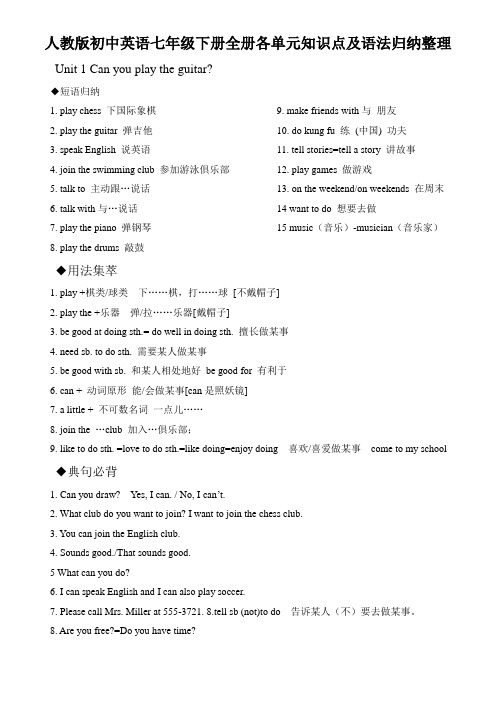
人教版初中英语七年级下册全册各单元知识点及语法归纳整理Unit 1 Can you play the guitar?◆短语归纳1. play chess 下国际象棋2. play the guitar 弹吉他3. speak English 说英语4. join the swimming club 参加游泳俱乐部5. talk to 主动跟…说话6. talk with与…说话7. play the piano 弹钢琴8. play the drums 敲鼓9. make friends with与朋友10. do kung fu 练(中国) 功夫11. tell stories=tell a story 讲故事12. play games 做游戏13. on the weekend/on weekends 在周末14 want to do 想要去做15 music(音乐)-musician(音乐家)◆用法集萃1. play +棋类/球类下……棋,打……球[不戴帽子]2. play the +乐器弹/拉……乐器[戴帽子]3. be good at doing sth.= do well in doing sth. 擅长做某事4. need sb. to do sth. 需要某人做某事5. be good with sb. 和某人相处地好be good for 有利于6. can + 动词原形能/会做某事[can是照妖镜]7. a little + 不可数名词一点儿……8. join the …club 加入…俱乐部;9. like to do sth. =love to do sth.=like doing=enjoy doing 喜欢/喜爱做某事come to my school◆典句必背1. Can you draw? Yes, I can. / No, I can’t.2. What club do you want to join? I want to join the chess club.3. You can join the English club.4. Sounds good./That sounds good.5 What can you do?6. I can speak English and I can also play soccer.7. Please call Mrs. Miller at 555-3721. 8.tell sb (not)to do 告诉某人(不)要去做某事。
人教版七年级英语下册单词短语句型语法总结
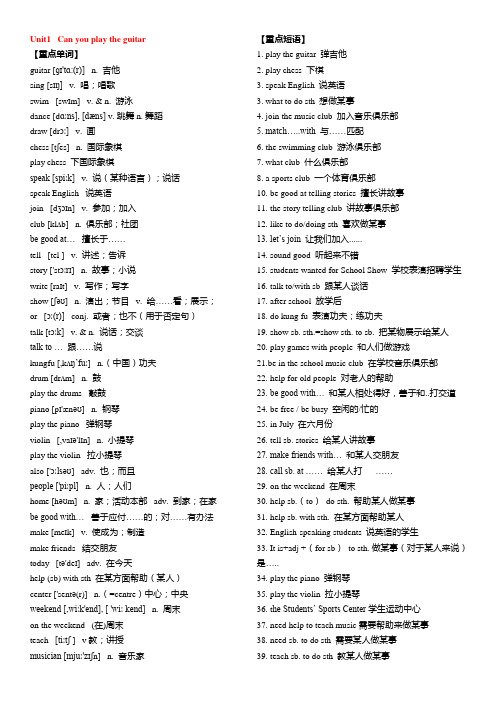
Unit1 Can you play the guitar【重点单词】guitar [ɡɪ'tɑ:(r)] n. 吉他sing [sɪŋ] v. 唱;唱歌swim [swɪm] v. & n. 游泳dance [dɑːns], [dæns] v. 跳舞 n. 舞蹈draw [drɔː] v. 画chess [tʃes] n. 国际象棋play chess 下国际象棋speak [spiːk] v. 说(某种语言);说话speak English 说英语join [dʒɔɪn] v. 参加;加入club [klʌb] n. 俱乐部;社团be good at… 擅长于……tell [tel ] v. 讲述;告诉story ['stɔːrɪ] n. 故事;小说write [raɪt] v. 写作;写字show [ʃəʊ] n. 演出;节目 v. 给……看;展示;or [ɔː(r)] conj. 或者;也不(用于否定句)talk [tɔːk] v. & n. 说话;交谈talk to … 跟……说kungfu [,kʌŋ’fuː] n.(中国)功夫drum [drʌm] n. 鼓play the drums 敲鼓piano [pɪ'ænəʊ] n. 钢琴play the piano 弹钢琴violin [,vaɪə'lɪn] n. 小提琴play the violin 拉小提琴also ['ɔːlsəʊ] adv. 也;而且people ['piːpl] n. 人;人们home [həʊm] n. 家;活动本部 adv. 到家;在家be good with… 善于应付……的;对……有办法make [meɪk] v. 使成为;制造make friends 结交朋友today [tə'deɪ] adv. 在今天help (sb) with sth 在某方面帮助(某人)center ['sentə(r)] n.(=centre)中心;中央weekend [,wiːk'end], [ 'wiː kend] n. 周末on the weekend (在)周末teach [tiːtʃ ] v教;讲授musician [mjuː'zɪʃn] n. 音乐家【重点短语】1. play the guitar 弹吉他2. play chess 下棋3. speak English 说英语3. what to do sth 想做某事4. join the music club 加入音乐俱乐部5. match…..with 与……匹配6. the swimming club 游泳俱乐部7. what club 什么俱乐部8. a sports club 一个体育俱乐部10. be good at telling stories 擅长讲故事11. the story telling club 讲故事俱乐部12. like to do/doing sth 喜欢做某事13. let’s join 让我们加入......14. sound good 听起来不错15. students wanted for School Show 学校表演招聘学生16. talk to/with sb 跟某人谈话17. after school 放学后18. do kung fu 表演功夫;练功夫19. show sb. sth.=show sth. to sb. 把某物展示给某人20. play games with people 和人们做游戏21.be in the school music club 在学校音乐俱乐部22. help for old people 对老人的帮助23. be good with… 和某人相处得好,善于和..打交道24. be free / be busy 空闲的/忙的25. in July 在六月份26. tell sb. stories 给某人讲故事27. make friends with… 和某人交朋友28. call sb. at …… 给某人打……29. on the weekend 在周末30. help sb.(to)do sth. 帮助某人做某事31. help sb. with sth. 在某方面帮助某人32. English-speaking students 说英语的学生33. It is+adj +(for sb)to sth. 做某事(对于某人来说)是…..34. play the piano 弹钢琴35. play the violin 拉小提琴36. t he Students’ Sports Center学生运动中心37. need help to teach music 需要帮助来做某事38. need sb. to do sth 需要某人做某事39. teach sb. to do sth 教某人做某事40. be in our school music festival 参加我们学校的音乐节【重点句型】1. —Can you swim你会游泳吗?—No,I can’t.不,我不会。
++Unit+3+重点难点梳理-人教版英语七年级下册
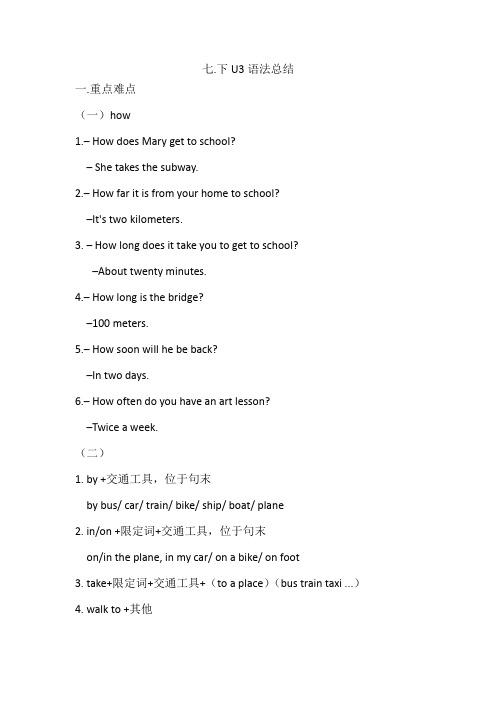
七.下U3语法总结一.重点难点(一)how1.– How does Mary get to school?– She takes the subway.2.– How far it is from your home to school?–It's two kilometers.3. – How long does it take you to get to school?–About twenty minutes.4.– How long is the bridge?–100 meters.5.– How soon will he be back?–In two days.6.– How often do you have an art lesson?–Twice a week.(二)1. by +交通工具,位于句末by bus/ car/ train/ bike/ ship/ boat/ plane2. in/on +限定词+交通工具,位于句末on/in the plane, in my car/ on a bike/ on foot3. take+限定词+交通工具+(to a place)(bus train taxi ...)4. walk to +其他5. ride a/one's bike + to 某地(bike motorbike horse)6. drive the/ one's car + to 某地例①I go to school by bus.= I go to school on a bus.②Mrs. Zhang usually takes the train to work.③Mrs. Zhang usually walks to work.④Mrs. Zhang rides horse to work.⑤Mrs. Zhang usually drives her car to work.二.具体小语法1. ①How do you get to school? get here/ there/ home②W e arrived in Shanghai this morning.③We arrived at school ten minutes ago.④We reached school just now .2. one hundred and five①There are five hundred students in this school.②There are hundreds of trees on the hill.3. ①I ride it to school every day.②Let's learn some every day English.4.– How far is it from your home to school.–It's two kilometers.–It's two kilometers away from my home to school.–It's about ten minutes' walk.–It's about ten minutes' drive.5. ①It is sure to r ain.②He is sure of success.③We are sur e(that)Mrs.Zhang will be more and more beautiful.6.– How long does it take you to get to school.–It takes me ten minutes to get to school .①人pay 钱for 物②人spend 钱on 物③物cost (人)钱①人spend 时间(in)doing sth.②It takes sb. some time to do sth.7. ①Mrs.Zhang often walks to work.= Mrs.Zhang often goes to work on foot.②Mrs.Zhang often ride a horse to work.= Mrs.Zhang often goes to work by horse (on a horse )③Mrs.Zhang often dr ives to work.= Mrs.Zhang often goes to work by car.(in a car )④Mrs.Zhang often flies to work.= Mrs.Zhang often goes to work by plane/ air.8. ①You can wait for the bus at the bus stop.②Buses come from bus station.③He's too tried, he stopped work ing, he stopped to have a rest.9. ①What do you think of Mrs.Zhang?= How do you like Mrs.Zhang?②I, m thinking about a problem.③He always thinks of others more than himself.④You'd better think it over.10. Crossing the river to school.They crossed the road.= They walked across the road.walk / go/ run/ swim + across = cross + street/ bridge11. ①It's difficult for us to finish the work.(difficult easy hard important dangerous )②It's very kind of you to help me.(kind good nice clever polite foolish )12. ①There is a teacher and twenty students in the classroom.②There are twenty students and a teacher in the classroom.13. ①The watermelon is among three trees.②Jim is sitting between John and Mary.14. ①There is no book on the desk.= There is not a book on the desk.②There is no water there.= There is not any water there.③I have no pens.= I don't have any pens.15. He is an 11–year –old boy.= He is a boy of 11years old.16. ①Are you afraid of sna kes?②Mrs.Zhang is afraid to go out at night.③Don't be afraid of making mistakes.④I'm afraid that I can't lend you so much money.17. ①She looks like her mother.②–What is Mrs.Zhang like?③l feel like a cup of tea.④It feels like silk.18. Many of the students and villagers never leave the village.19. ①I'm leaving for Beijing next week.②l will leave Heihe for Beijing next week.③I left my homework on the train.④I 'll leave here for two months.✘⑤I 'll be away from here for tow months.✔20. ①Everyone has a dream.②Mrs.Zhang dreams of becoming famous.21. ①Sleep live on grass.②The old man lives a healthy life.23. ①. I have to go. ②I must go.③She has to go . ④She must go.三.短语和句型1. take the train 乘火车2. take the bus 成公共汽车3. take the subway 乘地铁4. ride a bike 骑自行车5. get to 到达6. every day 每天7. how long 多长时间8. how far 多远9. be sure 确信10. by bike 骑自行车11. have a good day 玩的快乐12. walk to school 步行去上学13. bus stop 公交车站14. bus station 公共汽车站15. subway station 地铁站16. think of 认为17. between ... and 在...和...之间18. train station 火车站19. be like 像21. one-11-year-old boy 一个11岁的男孩22. be afraid of 害怕23. play with ... 和...玩24. come true 实现25. come true 不得不1. How does/ do (sb)get to ...?(某人)是怎么到达...的?2. How about ...? ...怎么样?3. How far is it from ... to ...?从...到...有多远?4. It takes sb . some time to do sth.做某事花费某人一些时间。
七下英语二单元语法

七下英语二单元语法
摘要:
一、七年级下册英语第二单元语法概述
1.单元主题
2.语法知识点
二、动词的一般现在时
1.动词的一般现在时构成
2.一般现在时的疑问句与否定句
三、动词的一般过去时
1.动词的一般过去时构成
2.一般过去时的疑问句与否定句
四、情态动词can的用法
1.can的肯定句与否定句
2.can的一般疑问句
五、日常交际用语
1.问候与介绍
2.道别与应答
正文:
七年级下册英语第二单元语法主要涉及动词的一般现在时、一般过去时以及情态动词can的用法,同时学习日常交际用语。
首先,本单元的主题是关于日常交际,通过学习不同场景下的问候、介
绍、道别等用语,提高学生的口语表达能力。
在此基础上,本单元还涉及动词的一般现在时和一般过去时,帮助学生更好地描述动作的发生时间。
在动词时态方面,一般现在时表示现在的习惯、事实或一般情况。
其构成是动词原形,如:I study English every day.一般过去时则表示过去某个特定时间发生的动作,其构成是动词过去式,如:I studied English yesterday.在学习这两个时态时,学生还需掌握疑问句和否定句的构成方法。
此外,本单元还讲解了情态动词can的用法。
can表示能力或允许,用于疑问句时,用can you提问;用于否定句时,用can"t表示不能,如:I can"t swim.对于can的一般疑问句,疑问部分用can you,肯定回答为Yes,I can;否定回答为No,I can"t。
Unit11重点知识和语法讲义-+2023-2024学年人教版英语七年级下册
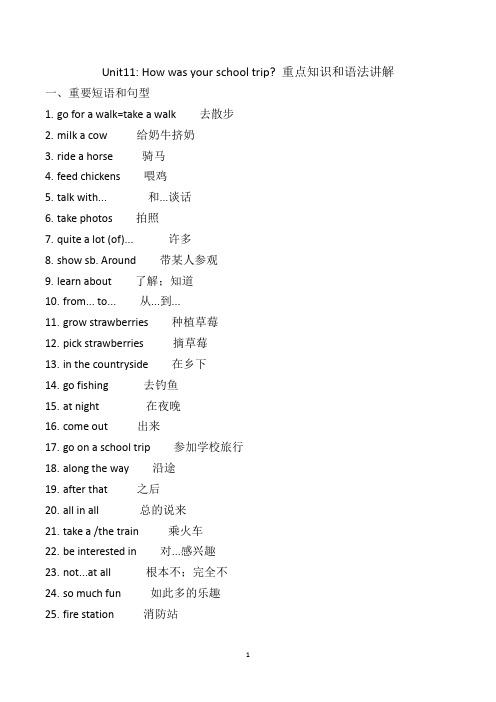
Unit11: How was your school trip? 重点知识和语法讲解一、重要短语和句型1.go for a walk=take a walk 去散步k a cow 给奶牛挤奶3.ride a horse 骑马4.feed chickens 喂鸡5.talk with... 和...谈话6.take photos 拍照7.quite a lot (of)... 许多8.show sb. Around 带某人参观9.learn about 了解;知道10.from... to... 从...到...11.grow strawberries 种植草莓12.pick strawberries 摘草莓13.in the countryside 在乡下14.go fishing 去钓鱼15.at night 在夜晚e out 出来17.go on a school trip 参加学校旅行18.along the way 沿途19.after that 之后20.all in all 总的说来21.take a /the train 乘火车22.be interested in 对...感兴趣23.not...at all 根本不;完全不24.so much fun 如此多的乐趣25.fire station 消防站26.make a model robot 制作机器人模型27.climb the mountains 爬山28.How be...? ......怎么样?29.How do/does +主语+feel about...? ...对...感觉如何?30.teach sb. how to do sth. 教某人怎样做某事31.buy sth. for sb. =buy sb. sth. 为某人买某物32.It’s +形容词+to do sth. 做某事是...的33.sound+形容词听起来...二、重要知识点讲解1.feed 及物动词,“喂养;饲养”,过去式是fed。
- 1、下载文档前请自行甄别文档内容的完整性,平台不提供额外的编辑、内容补充、找答案等附加服务。
- 2、"仅部分预览"的文档,不可在线预览部分如存在完整性等问题,可反馈申请退款(可完整预览的文档不适用该条件!)。
- 3、如文档侵犯您的权益,请联系客服反馈,我们会尽快为您处理(人工客服工作时间:9:00-18:30)。
Unit5 Why do you like pandas知识要点like…a lot 非常喜欢… black and white 黑白相间 all day整天Let’s do= let us do 让我们做…… kind of 有点儿,稍微South Africa南非be from/come from 来自于save the elephants救助大象one of…其中之一a symbol of good luck好运的象征 get lost迷路 cut down 砍倒for a long time 很长时间 in great danger处于(极大)危险之中things be made of ivory由象牙制成的东西places with food and water有食物和水的地方常用短语:1.see the pandas 看熊猫2.my favorite animals我最喜欢的动物3.welcome to sp 欢迎来某地4.welcome back to sp 欢迎回到某地5.be from 来自e from来自7.in the zoo 在动物园里8.on the farm 在农场里9.my new pet 我的新宠物10.walk on two legs 用两条腿走11.kind of有点12.kind of interesting有点有趣13.a little有点14.a little boring有点无聊15.a kind of一种16.all kinds of 各种各样的17.all day整天18.a good name for sb对某人是一个好名字19.South Africa南非20.South China华南21.South America南美洲22.America, the USA美国23.the UK ,England英国24.the South Pole南极25.what animals什么动物26.save the elephants挽救大象27.one of +n复数。
之一28.the first lesson=Lesson One第一课29.clever聪明的,机灵的30.cute聪明的,可爱的31.smart聪明的,顽皮的32.bright聪明的,伶俐的33.an ugly face一张丑陋的脸34.be friendly to…对某人友好35.be friendly with和某人关系好36.be kind to sb对某人善良、好37.be good to sb对某人好38.the other people=the others其他的人39.many other animals许多其他的动物40.three other men另外三个男人41.another three men另外三个男人42.three more men另外三个男人43.else其他的,它放在疑问代词和不定代词后44.other其他的,它放在名词前45.eat grass吃草46.go to sleep 睡着,入睡47.go to bed上床睡觉48.every day每天49.everyday日常的50.a symbol of good luck好的幸运标志、象征51.forget to do sth忘记要做某事52.forget doing sth 忘记做过某事53.walk for a long time走很长时间54.be/get lost迷路55.never get lost从不迷路56.places with food and water带有食物和水的地方57.be in (great) danger在危险中58.cut down砍倒59.cut into pieces切成碎片60.cut off切断61.kill…for…为。
杀。
62.be made of由。
制成的63.Thai Elephant Day泰国大象节句型转换1、want sb to do sth =would like sb to do sth2、Go shopping with sb (go shopping=do some shopping)3、I do not have any money -i have no money(no=not any ;no=not a/an)4、Can i help you=may i help you =what can i do for you5、Take a look =have a look =look6、How much do the cards cost=how much are the cards一、语法要点:1. Why don’t you+动词原形:为什么不…交际语中常见的结构,常用来提建议和请求,或征询对方的看法和意见。
相当于Why not+动词原形。
Eg:Why don’t we meet earlier=Why not meet earlier肯定回答:OK! All right./Good idea./Yes,I think so. 否定回答:Sorry,I…/I’m afraid not.表建议的句型:How/What about… 怎么样You should do…你应…Let’s do… 让我们…Shall we do…我们…好吗Would you like to do…你愿意…吗 You’d better do sth 2. 形容词的用法:形容词修饰名词,用以说明事物或人的性质或特征。
形容词是英语中最常用的词性之一,它通常在句中作定语、表语等。
①作定语形容词用于修饰名词或代词one,ones,作定语,位于名词或代词之前This is an old book.这是一本旧书。
I want some large ones.我想要写大的。
②作表语形容词放在连系动词(be/look/feel/sound等)后,作表语,构成系表结构,即“连系动词+表语”,说明主语是什么或怎么样,即说明主语的特性。
They’re cute. 它们很可爱。
He looks very happy.他看起来很高兴。
二、重点单词与短语made of (原材料可见)VS be made from(原材料不可见)由…制成2:kind of:有点儿是固定用法,常见口语中,意为“有点儿”,常用来修饰形容词。
例如:考拉有点害羞。
Koalas are kind of shy. Kind of+adj.“kind”可做名词,意为“种类”。
短语what kind of....哪种What kind of food do you likeall kinds of 各种各样different kinds of 不同种类的a kind of +n. 一种…“kind”还可做形容词,意为“善良的、友好的”。
Her mother is a kind woman.Be kind to sb=be friendly to sb3、family:集合名词,是单数还是复数看意思。
表示“家庭”整体的时候,做主语,谓语用单数;表示“家庭成员”时,做主语,谓语用复数。
House:指居住的建筑物Home:指家庭成员所居住的环境或与房屋有关的“家”。
4、over:prep:在…上方遍及 We have friends all over the world。
Adv:结束 The film is over. 经过 The plane flew over about an hour.5、all night:整夜 all morning:整个上午 all year round:全年“all”形容词,意为全部的,整个的,与单数名词连用时,表示某事在某段时间内持续发生。
:他整日整夜的玩。
He plays all day and night.“all”做形容词时,还可与可数名词复数或不可数名词连用,表示“全部、所有;一切”。
此时名词前可用the, this, that, my ,her 等修饰;可数名词复数前还可用数词修饰。
All her friends are her. All the students go home after school.6、save:救助;节省save one’s life/save sth for sb为某人节省某物/save money:攒钱/save water节约用水7、one of+名词的复数形式,作主语时谓语用单数:one of my friends travels to New York. Two of…:…中的两个Some of…:…中的一些 most of…:..中的大多数Many of…:…中的许多All of…:…中的全部8.symbol是一个名词,意为“象征,标记”。
常用短语a/the symbol of......表示象征.。
.The dove is /the symbol of the peace. 白鸽是和平的象征。
9. danger是一个名词,意为危险,常用短语 be in danger意为遇险.danger前可用great修饰,表示“巨大的”.be in great danger 意为面临巨大的危险10. with.是一个介词 prep.意为“.与...一起,偕同,和...”.: She watches TV with her sister. 她和她姐妹一起看电视。
With做介词还有“带有...;有...的”之意,其后面接一个名词构成介词短语修饰前面的名词。
.:那个长头发的女孩是我同学。
The girl with long hair is my classmate11. get lost迷路=lose one’s way【知识点拨】重点词汇及句型用法讲解:1)Why 是特殊疑问词,意为“为什么”,用来引导询问原因的特殊疑问句。
常用because 引导的句子来回答,表示直接的原因或理由。
你为什么喜欢音乐因为它有趣.Why do you like music Because it’s interesting.注意:在英语中用because 不用so,或用so不用because 如:2] But I like tigers a lot.“a lot ”是固定搭配,意为“非常”,在句中做副词,相当于very much.短语“like......a lot ”意为非常喜欢(=like......very much.)例句:玛丽非常喜欢汉堡包。
Mary likes hamburgers a lot/( very much)3]. I like dogs because they’re friendly and smart.1、“friendly” 是一个形容词,它是由名词“friend”加上“ly”构成的,意为友好的.常用短语be friendly to sb ,意为对某人友好/友善;be friendly with sb意为和某人友好相处.is this It’s a rubber. 2. _______ are you I’m fine._______ rubbers are there in the pencil-box_______ is your brother He’s nine.are they They are cows.6. _______ do you feel We are happy.is your father He is a dentist.does he go to school He goes to school by bus.are the ducks They are on the river.10. ______ is his name He is Martin.11. _______ ________ new books have you got Five.________ is the tree It’s green.13. _______coats are these Mary’s.课时练习 1一、英汉互译(30分)1. kind of _________2. 一整天 ___________3. be from ____________4. Why don’t you ________________5. 黑白相间 ____________________6. a smart koala __________7. an interesting dolphin ____________________8. 各种各样的_______________ 9. 有几分可爱 ________________________10. 我们首先一起去看长颈鹿吧。
